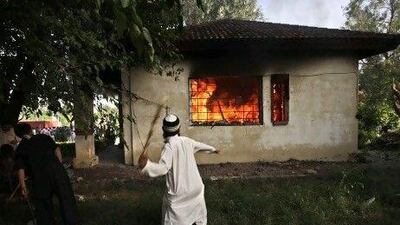TUNIS //Tunisia said yesterday it had banned all demonstrations against the anti-Islam film that had been planned for today, while in Pakistan the army was called in as protests turned violent in Islamabad.
The interior ministry in Tunisia took the decision to ban protests after receiving a tip-off about preparations for violence over cartoons of the Prophet Mohammed published by a French satirical weekly.
"The interior ministry ... announces that it is outlawing any form of demonstration anywhere in Tunisian territory on Friday," the ministry said yesterday.
Protests continued across the world yesterday. The most violent took place in Pakistan's capital where 50 protesters were injured as they tried to reach the heavily guarded diplomatic enclave that is home to the US, British and French missions.
An initial demonstration of about 1,000 swelled with the arrival of protesters carrying the flags of Islamist groups Jamaat-ud-Dawa, Jamaat-e-Islami and Sipah-e-Sahaba - which is banned by the Pakistan government.
Police fired tear gas and bullets as the protesters, who chanted "we are ready to die to safeguard the Prophet's honour" and demanded punishment for those who insult Islam. They stormed a police barrier, leading to the deployment of troops. "Islam is often ridiculed by America and the West and blasphemy is committed against our Prophet in the name of freedom of expression," said Rehan Ahmad, a protester.
Bigger protests were expected in Pakistan today, which the government has declared a national holiday and "day of love for the Prophet" as a mark of solidarity with fellow Muslims angered by the film.
The severity of the protests has led to the US airing adverts on Pakistani television to disassociate itself from the anti-Muslim film.
Many political and religious groups have called for people to take to the streets. The information minister, Qamar Zaman Kaira, pleaded for restraint.
"I appeal to the people to remain peaceful," he said. "Indulgence in violence will not convey any positive message abroad."
There was no mention at the Islamabad protest of the cartoons published on Wednesday by the French magazine Charlie Hebdo caricaturing the Prophet Mohammed. France fears its overseas outposts could come under attack and has closed its embassies, cultural centres and French schools in about 20 Muslim countries.
Authorities in Paris said they would not permit protests today and police detained a young man in southern France yesterday on suspicion that he was planning a revenge attack on the staff of the satirical magazine.
Antiterrorism magistrates near the Mediterranean port city of Toulon questioned the 18-year-old after he threatened, in a message on Facebook, to cut the throats of anyone he could find at the offices of Charlie Hebdo, a judicial source said.
In Tunisia, the ruling Ennahda party responded to the printing of the controversial images by saying Muslims had the right to protest peacefully.
Also yesterday, Iran condemned the cartoons of the Prophet Mohammed, the foreign ministry spokesman Ramin Mehmanparast was quoted as saying by the Isna news agency.
"It is obvious that the principle of freedom of expression should never be used as a pretext to insult beliefs and religions," he said. "The French government is expected ... to take the necessary actions to condemn this offensive material."
Up to 200 people protested without incident in front of the French Embassy in Tehran. Protests were also reported in Indonesia, Afghanistan and Indonesia.
The White House also said yesterday the assault on the US consulate in Libya that resulted in the deaths of the ambassador and three other Americans last week was the work of terrorists.
"It is self-evident that what happened in Benghazi was a terrorist attack," said the White House spokesman, Jay Carney.
The US secretary of state, Hillary Clinton, yesterday announced the launch of an independent inquiry into security at the US mission.
It comes as the US has bought airtime on Pakistani television to run adverts in an attempt to stem Muslim protests at the amateur anti-Islam film, a US official said on Wednesday. The US state department has spent about US$70,000 (Dh257,119) to air the advert in Urdu across seven Pakistani TV channels to disassociate the US government from the inflammatory film, said Victoria Nuland, a spokeswoman.
* With additional reporting by Reuters

